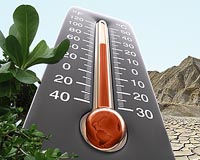| . |  |
. |
Washington (AFP) Feb 21, 2011 Ragweed allergy season in North America has grown two to four weeks longer in recent years because of warmer temperatures and later fall frosts, researchers said. Northern parts of the United States and Canada have seen the most dramatic rise in allergy season length between 1995 and 2009, said the study to be published in Tuesday's edition of the Proceedings of the National Academy of Sciences. The city of Saskatoon in Saskatchewan, Canada saw the longest pollen season, adding 27 more days in 2009 compared to 1995. Winnipeg, Manitoba saw a 25-day increase during the same period. Fargo, North Dakota and Minneapolis, Minnesota each saw allergy seasons extend 16 days. But looking further south, Rogers, Arkansas and Georgetown, Texas saw decreases of several says in their pollen seasons. The study said the starker changes in the northern latitudes were consistent with the United Nations' Intergovernmental Panel on Climate Change projections of more intense warming in areas closer to the Arctic. "Latitudinal effects on increasing season length were associated primarily with a delay in first frost of the fall season and lengthening of the frost-free period," the study said. "Overall, these data indicate a significant increase in the length of the ragweed pollen season by as much as 13-27 days at latitudes above 44 degrees north since 1995." Scientists used pollen measurements from the US National Allergy bureau and Canada's Aerobiology Research Laboratories, combined with data from US weather stations, Environment Canada and the Canadian National Climate Data and Information Archive. Ragweed allergies, often called hayfever, strike as many as 30 percent of Americans, typically in warmer seasons. Symptoms range from sneezing and sniffling to severe asthma. The culprit is a family of plants belonging to the genus Ambrosia, whose flowers send off tiny grains of pollen that the body recognizes as a threat.
Share This Article With Planet Earth
Related Links Climate Science News - Modeling, Mitigation Adaptation
 If Greenhouse Gas Emissions Stopped Now, Earth Still Would Likely Get Warmer
If Greenhouse Gas Emissions Stopped Now, Earth Still Would Likely Get WarmerSeattle WA (SPX) Feb 17, 2011 While governments debate about potential policies that might curb the emission of greenhouse gases, new University of Washington research shows that the world is already committed to a warmer climate because of emissions that have occurred up to now. There would continue to be warming even if the most stringent policy proposals were adopted, because there still would be some emission of he ... read more |
|
| The content herein, unless otherwise known to be public domain, are Copyright 1995-2010 - SpaceDaily. AFP and UPI Wire Stories are copyright Agence France-Presse and United Press International. ESA Portal Reports are copyright European Space Agency. All NASA sourced material is public domain. Additional copyrights may apply in whole or part to other bona fide parties. Advertising does not imply endorsement,agreement or approval of any opinions, statements or information provided by SpaceDaily on any Web page published or hosted by SpaceDaily. Privacy Statement |